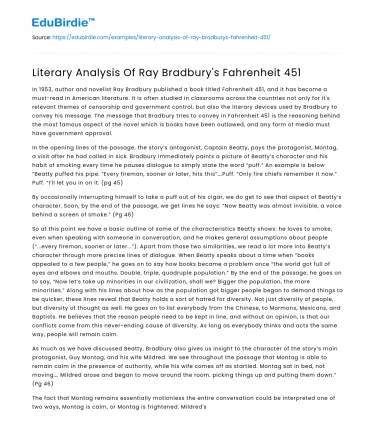In 1953, author and novelist Ray Bradbury published a book titled Fahrenheit 451, and it has become a must-read in American literature. It is often studied in classrooms across the countries not only for it's relevant themes of censorship and government control, but also the literary devices used by Bradbury to convey his message. The message that Bradbury tries to convey in Fahrenheit 451 is the reasoning behind the most famous aspect of the novel which is books have been outlawed, and any form of media must have government approval.
In the opening lines of the passage, the story’s antagonist, Captain Beatty, pays the protagonist, Montag, a visit after he had called in sick. Bradbury immediately paints a picture of Beatty’s character and his habit of smoking every time he pauses dialogue to simply state the word “puff.” An example is below “Beatty puffed his pipe. “Every fireman, sooner or later, hits this”….Puff. “Only fire chiefs remember it now.” Puff. “I’ll let you in on it. (pg 45)
Save your time!
We can take care of your essay
- Proper editing and formatting
- Free revision, title page, and bibliography
- Flexible prices and money-back guarantee
By occasionally interrupting himself to take a puff out of his cigar, we do get to see that aspect of Beatty’s character. Soon, by the end of the passage, we get lines he says: “Now Beatty was almost invisible, a voice behind a screen of smoke.” (Pg 46)
So at this point we have a basic outline of some of the characteristics Beatty shows: he loves to smoke, even when speaking with someone in conversation, and he makes general assumptions about people (“...every fireman, sooner or later...”). Apart from those two similarities, we read a lot more into Beatty’s character through more precise lines of dialogue. When Beatty speaks about a time when “books appealed to a few people,” he goes on to say how books became a problem once “the world got full of eyes and elbows and mouths. Double, triple, quadruple population.” By the end of the passage, he goes on to say, “Now let’s take up minorities in our civilization, shall we? Bigger the population, the more minorities.” Along with his lines about how as the population got bigger people began to demand things to be quicker, these lines reveal that Beatty holds a sort of hatred for diversity. Not just diversity of people, but diversity of thought as well. He goes on to list everybody from the Chinese, to Mormons, Mexicans, and Baptists. He believes that the reason people need to be kept in line, and without an opinion, is that our conflicts come from this never-ending cause of diversity. As long as everybody thinks and acts the same way, people will remain calm.
As much as we have discussed Beatty, Bradbury also gives us insight to the character of the story’s main protagonist, Guy Montag, and his wife Mildred. We see throughout the passage that Montag is able to remain calm in the presence of authority, while his wife comes off as startled. Montag sat in bed, not moving…. Mildred arose and began to move around the room, picking things up and putting them down.” (Pg 46)
The fact that Montag remains essentially motionless the entire conversation could be interpreted one of two ways, Montag is calm, or Montag is frightened. Mildred's behaviors come off as being a little less unclear. She is nervous. The entire time Beatty is talking Mildred either fiddles around, gets up or repeats the last words of Beatty's sentences to Montag. The reason for Mildred's nervousness cannot be entirely revealed without understanding deeper into the story, but Bradbury paints the picture of each character's feelings and behaviors: Beatty is snobby and upset, Mildred is a nervous wreck, and Montag is taking it all in.
There are many examples like those above throughout Fahrenheit 451, and Ray Bradbury proves through the use of said examples that he was deserve of his title as an extremely fluent author, or poet. Hopefully, while studying this novel, somebody else sees how powerful the use of words in a piece of work can be when creating a world the reader can see before them.






 Stuck on your essay?
Stuck on your essay?

